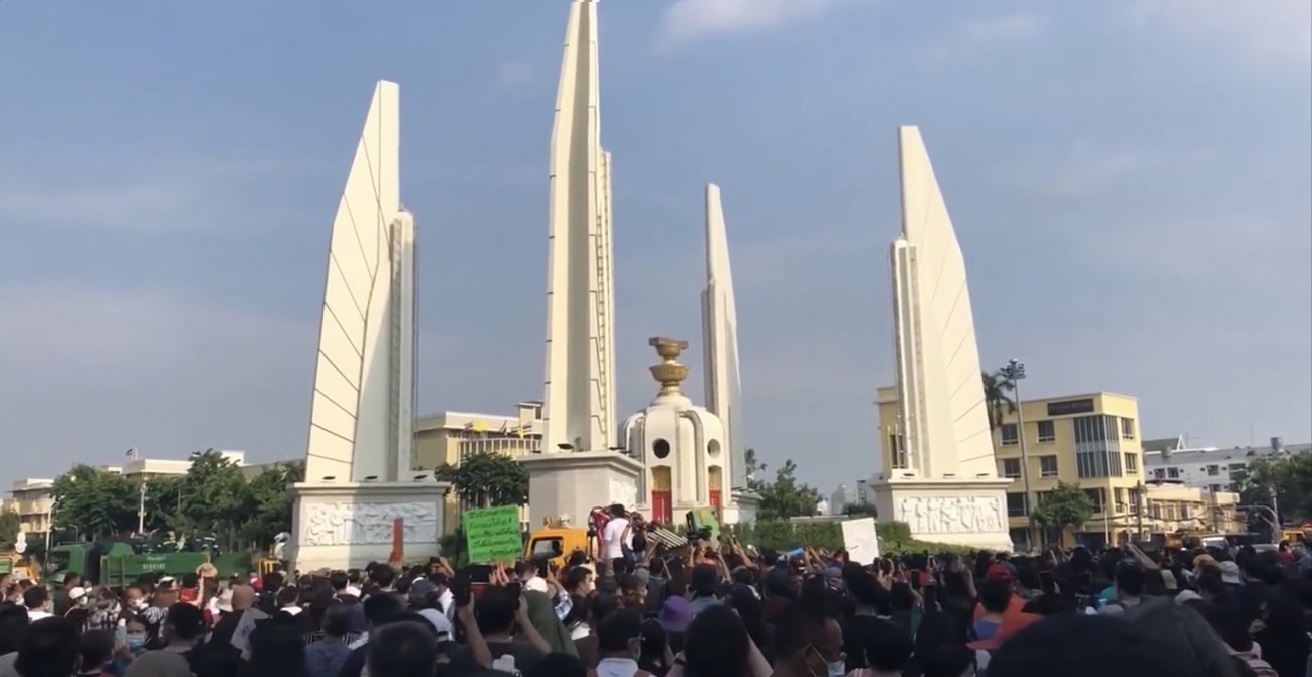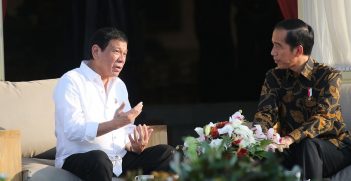In Vain Hope: Thailand's Anti-Government Protests

Small, student-led protests against the current Thai government, the present constitution, and the monarchy began to occur across Thailand in the middle of this year. The protests have grown dramatically in the past two months. Whether these protests will be fruitful in altering the current structure of governance remains questionable.
This is an article published earlier this year and selected by our committee of commissioning editors as one of the best of 2020. It was originally published on 11 September.
In July, crowds began to gather at the Democracy Monument in the middle of a large avenue in Rattanakosin, the old part of Bangkok. Protesters have convened on subsequent Sundays in growing numbers – according to some reports as many as 20-30,000 on August 16. There have also been large rallies at Thammasat University. Evidently small protest rallies have been held across a majority of Thailand’s 76 provinces in recent weeks. The government coalition and opposition grouping in the House of Representatives have already prepared proposals for the reform of the constitution, quite explicitly in an attempt to cut the ground from under the feet of the protesters. The latter have formulated three principal demands of the government, and there has also emerged a list of ten changes which some of the student leaders consider must be made to the place of the monarchy in the governance of the Kingdom of Thailand.
The protesters’ demands
The three core demands of the protesters are ending the intimidation of critics of the government, amending the constitution, and holding new elections. In an Asia Sentinel article last week, Pithaya Pookaman also noted that the students expressed strong opposition to any move to establish a “government of national unity.” The core demands do not include a demand for the abolition of the monarchy. In fact, in a placatory move, the protesters have endorsed the maintenance of a constitutional monarchy, a stratagem which may have been instrumental in bringing on board the United Front for Democracy against Dictatorship (the Red Shirts). On the other hand, the call for the redrafting of the constitution envisages substantial changes in the roles and power of the monarchy, in effect the restoration of the balance between monarch, state and nation that characterised the constitutional monarchy as established after the revolution of 1932, and the end of absolute monarchy. It has commonly been observed that recent changes to the roles and power of the monarchy have taken the country a long way back towards absolutism.
A further ten-point list of demands emerging from some of the student leaders – including Panusaya Sithijirawattanakul, who read it to a meeting at Democracy Monument, possibly against the wishes of the rally’s organisers – has specifically to do with the place of the monarch in Thai governance. In particular the demands include, as reported by Reuters, the reversal of “the 2019 order that transferred two army units to the king’s personal command, and a 2017 law that gave him full control of the crown’s extensive property holdings.” A Facebook group called Royalists Marketplace, a forum for discussion of reform of the place of the monarchy, that was formed by the exiled Pavin Chachavalpongpun was blocked by Facebook under pressure from the Thai government, but has since been replaced by another Marketplace – again with Pavin as administrator – which already has a membership larger than that of the first group at well in excess of one million people.
The students’ demands have included, of course, the demand that Section 112 of the Constitution, which establishes the crime of lese majeste (insulting the monarch), be repealed. Vajiralongkorn has apparently ordered that no-one should be charged with this crime anymore. However, it is one of Pavin’s contentions that recourse to the Computer Crimes Act in conjunction with the accusation that a person has been guilty of changchat (anti-patriotism) has the same effect as being convicted of the charge of lese majeste. What remains distinctively “Thai” about the new approach is that those charged with cybercrimes are also accused of changchat, or “hatred of nation.” The discourse of changchat, which glorifies the monarchy as the nation’s heart and soul, legitimises the arrest of critics of the monarchy, as well as the blocking of critical content on the internet against the royal institution. Hating the monarchy is equal to hating the nation, hence an elimination of the haters is justified.
The high school students among the protesters have been chafing under a more particular constraint due to the stricter discipline that schools have been pressured to enforce during the years of military rule, and the following period of military-dominated government under the present constitution.
Moves for reform within the House of Representatives
Quickly following the rise of the student movement, the loose coalition of opposition parties and the formal coalition of government parties in the House of Representatives have put forward their own proposals for reform. So far, most of the parliamentarians have made only a cautious reference to the demand for abolition of military appointments of the 250 members of the Senate and the demand that the parliament should abandon its ratification of the decisions of the National Council for Peace and Order (the junta that took power in 2014). Just as there are divisions within the student movement, there are divisions within the parliamentary opposition, with the leadership of the major opposition party, Pheu Thai, vying with the leadership of the Move Forward party for the higher moral ground. Just how sensitive any constitutional reform will be to the manner of establishing the process of charter reform was pointed out late last year by Titipol Phakdeewanich, dean of political science at Ubon Ratchathani University. In any case, the past three years have made very clear the importance of the membership of the Constitutional Court and the Electoral Commission, which together banned the highly successful new party, Future Forward (FFP). The latter’s parliamentarians transferred to the Move Forward party after the banning. (The Move Forward party is not to be confused with the widely supported Progressive Movement set up in March by the two major figures of the banned FFP.)
The fragility of the military’s support of the government
In the meantime, recent changes within the military are in the process of changing the authority of Prayuth Chan-ocha as prime minister, and the relationship between the monarch and the government. Nikkei Asian Review reported the rising prospect of the succession of the current army chief general Apirat Kongsompong by General Narongphan Jitkaewthae – over General Natthapon Nakpanich – this month. The significance of this is that Narongphan is reportedly a favourite of the king, while Natthapon is allied with the prime minister. In the background to this prospective appointment are moves the king has made to bring the army under the control of the 7,000-strong (and growing) King’s Guard. Both the retiring head of the army and the prospective new head are said to be uncomfortable with the way that Prayuth and two fellow generals – who as a troika staged the 2014 coup – have been manipulating the army through the prime minister’s party, Palang Pracharat.
An apparently weak royalist blowback
Self-declared royalists are evidently thin on the ground at the moment. Only small numbers have turned out to their bright yellow demonstrations. Of course, there are many more people who are loyal to the Chakri royal dynasty, despite what must seem to them to be the very unkingly demeanour of Maha Vajiralongkorn. The king has chosen to live in Bavaria for much of the recent years – a choice that is widely known but not a subject of public comment. Much to the bemusement of all, the king’s ex-consort, Sineenat Wongvajirapakdi, has flown to Bavaria to join the king, after having been released recently from apparent imprisonment and having had restored to her all her royal titles (while evidently Queen Suthida is in Switzerland).
But are the protesters to face the fate of Sisyphus?
This uprising is different from the uprisings of 2010 and 2014. The protestors are young and, as the noted Bangkok Post commentator Thitinan Pongsudhirak has argued eloquently, they are their own people. All the same, the student protesters face the formidable opposition of a government that is under the control of the military, of established political parties unwilling to acknowledge the Movement with which the students identify, of a king whose avarice has robbed the people of the vast assets of the Crown Property Bureau and whose position and appropriations are made increasingly secure by a compliant military, and of a ruling class which has found its interests to have been well served and for long has been complacent. The current protest is sometimes represented as a protest of the young against their elders, and commentators are right to urge the generations to make common cause. However, it is likely a vain hope that people of the older generation middle class – who have stood by and supported yellow-shirts against rural-based red shirts they consider ignorant and uncouth, have stood by the military and generally cooperated with military rule, and have stood by while respect for the monarchy is squandered by the institution itself – will do more than quietly and privately compliment the youthful protesters on their pluckiness.
Dr Gavan Butler is an honorary associate in political economy at the University of Sydney. He is also a member of the editorial committee of the Journal of Australian Political Economy.
This article is published under a Creative Commons Licence and may be republished with attribution.





